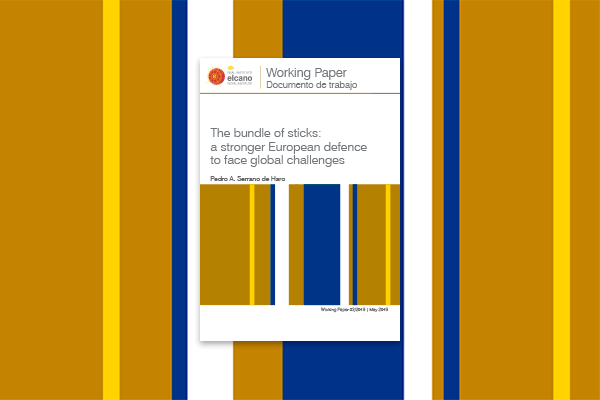Summary
After an overview of external challenges, this paper will describe some of the main initiatives developed by the EU in the field of security and defence during the last three years and how this has led to a stronger engagement with key international partners. It will conclude with some reflections regarding the value of the EU as a platform for cooperation to face global challenges and on strategic autonomy.
Introduction
The past three years have seen significant developments in the field of European security and defence. Mostly, they have been pursued in the framework of the implementation of the Global Strategy presented by the High Representative for Common Foreign and Security Policy and Vice-President of the European Commission (HRVP), Federica Mogherini, in June 2016. The main aim is to improve the EU’s capacity to promote its interests and values in an increasingly challenging international environment.
Terrorism, irregular migration, cyber-attacks and foreign interference, including disinformation, figure among the most pressing security concerns of European citizens and societies. Some of these issues are having a significant impact on Europe’s national political landscapes. But to tackle them properly it is key to have a clear and common understanding of their causes.
The Arab Spring revolutions of 2011, and resulting conflicts in Syria, Iraq, Yemen and Libya, as well as destabilisation in the Sahel, have unsettled regional balances and provided space for a new wave of terrorism. Instability and refugees fleeing from conflict have contributed to opening new routes for irregular migration. Organised crime has found a fertile ground in which to spawn, strengthening links to terrorist groups and promoting migrant smuggling and trafficking in human beings. To the East, the 2014 annexation of Crimea and the conflict in Ukraine has brought back into Europe pressing threats to sovereignty and territorial integrity. Hybrid methods of aggression have shown the need to respond in a more complex manner and to enhance societal resilience. A return to global strategic competition further interferes with regional crises and adds new transnational dimensions to challenges and threats.
The EU and its Member States are directly affected and concerned. The level of threat at their doorstep has increased exponentially in the past decade. And they are inevitably part of the broader strategic competition. During the past few years they have been actively developing security and defence instruments and capabilities, they have enhanced their engagement with their partners, notably with NATO, and they have continued to pursue multilateral track to reinforce international peace and security.
Cooperation on development of defence capabilities has, no doubt, been one of the areas of greater expansion, notably through the establishment of Permanent Structured Cooperation (PESCO) and work on a European Defence Fund (EDF). But the EU is also increasing its crisis-management effectiveness with initiatives such as the Military Planning and Conduct Capability (MPCC), the Civilian Compact and the proposal for a European Peace Facility (EPF). The EU is looking more strategically at its deployments to maximise the impact of its efforts, be it in the Sahel or on the high seas, or in other regions, including the Middle East. Conscious of the complex nature of the challenges, it is also developing instruments to face hybrid threats and enhance awareness, including improved cyber security and defence capabilities. The protection of strategic sectors and infrastructure has become a priority.
While enhancing its capacity to act, including autonomously if required, the EU is convinced of the need to cooperate with its partners in addressing security challenges.
The Transatlantic relationship remains crucial to Europe’s security. Ties with NATO have been strengthened considerably through Joint Declarations in 2016 and 2018, co-signed by Secretary General Stoltenberg, President of the European Council Tusk and President of the European Commission Juncker. In fact, much of what the EU has developed recently in the field of defence will support NATO directly, notably as regards capabilities and military mobility. It will also contribute to an improved burden-sharing, particularly as regards hybrid threats and challenges coming from the South.
And a new and strong relationship in the field of security and defence will need to be built with the UK after the latter’s departure from the EU. Challenges and interests will remain common. Most of the EU’s security and defence instruments, including those developed more recently, foresee openings for cooperation with third States. It is to be hoped and expected that the UK will wish to avail itself of such possibilities.
Finally, the EU has continued pursuing a multilateral approach to international peace and security, seeking to strengthen common understandings of the challenges within the international community and develop common approaches to contain proliferation, promote disarmament and prevent an arms race, including in outer-space and in the use of artificial intelligence.
The EU offers its Member States an unparalleled platform for cooperation on all these matters. The breadth of its scope for action and variety of tools allow it to develop integrated approaches covering the complex nature of today’s challenges and linking the internal and external dimensions of security. Jointly, the EU and its Member States are among the world’s most powerful actors. They can project a capacity that dwarfs most others. But having such a capacity is not enough. Tyrtaeus, a Spartan poet, sung that it is not the athletic, artistic or intellectual qualities of a soldier that will bring victory, but his fortitude when faced with the terrible sights of war and his courage in fighting the enemy. The success of the EU will ultimately depend on its Member States’ commitment to promote and defend their common interests and on their determination in this collective engagement. The EU and its Member States are reaching a watershed moment. It is important that this be clearly understood and acted upon.
After an overview of external challenges, this paper will describe some of the main initiatives developed by the EU in the field of security and defence during the last three years and how this has led to a stronger engagement with key international partners. It will conclude with some reflections regarding the value of the EU as a platform for cooperation to face global challenges and on strategic autonomy.
Pedro A. Serrano de Haro
Deputy Secretary-General, European External Action Service
1 This paper expresses the author’s personal views, which are not necessarily those of either the European External Action Service or the EU itself.



